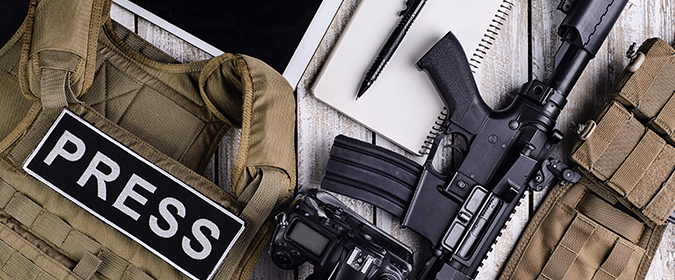
On Veterans Day, we honor the women and men who’ve served in America’s armed forces, and part of honoring that service includes reading and knowing about the issues that affect the military and veteran communities.
Journalists reporting on the military, often in war zones, devote their days to ensuring that the issues affecting military men and women get the news coverage they deserve. And while plenty of those reporters are civilians, there are many who are veterans themselves and have returned to the civilian workforce with a desire to further the understanding of the issues they faced while in the military.
“When I was in the Army I realized that the military is like 90 percent dog and pony show…. I’d read stories about events that I had been involved in or witnessed firsthand and get [annoyed] because what I was reading didn’t accurately reflect what I had experienced,” says Adam Linehan, an Army veteran.
Linehan has been writing about the military for five years, ever since separating from the Army in 2012. His work has appeared in Maxim, The New York Times and New York Magazine, among others. He is also a senior staff writer for Task & Purpose, a military news and culture website. Linehan’s experience in the Army convinced him that there was a need for more knowledgeable coverage of the issues he was facing as an active-duty soldier. “I figured maybe I could do a better job getting closer to the truth than a lot of the journalists out there,” he says. “So I took a stab at it and got lucky.”
For James LaPorta, a U.S. Marine Corps veteran, becoming a journalist gives him a sense of purpose similar to the one he felt as a Marine. “Being a journalist to me is no different than working in the U.S. intelligence community, you’re just serving a different audience,” says the former intelligence cell chief. “Mostly, I was looking for internal purpose after leaving the military and I saw journalism as an extension of my military service to the public. I believe that quality journalism is just as important to the survival of a democracy as the armies guarding its borders.”
Now, LaPorta writes about defense for The Daily Beast and UPI, and uses his experience in the service to inform how he covers the issues facing the military community.
Others, like active-duty soldier Crispin Burke, come to journalism because they want the opportunity to examine the world in which they operate. “I didn’t feel as if my military education and my interactions with senior leaders really exposed me to strategic issues or forced me to critically examine the military,” Burke says. “My blog allowed me to do so. I got to interact with military and civilian leaders throughout the world, with a wide range of perspectives on national security issues.”
Burke has written for Foreign Policy, The New York Times, and War on the Rocks, among other outlets, and has used his writing to help further the discussion on matters of policy and procedure in the military.
Over the past few years, veterans like Burke, LaPorta Linehan have seen more journalists join their beat. Stories on topics such as the failures of the Department of Veterans Affairs; the decision to send more troops to Syria; and the growing tensions with Russia and North Korea have made military and defense issues more relevant than ever. But not all reporters are veterans, and for those who don’t regularly cover these topics, there’s a lot of on-the-job training required.
For those reporters who are newer to covering the military, Linehan suggests starting at the bottom — by interviewing not just commanders, but enlisted men and women. “Don’t let officers hover over your shoulder when you’re interviewing their joes or you’re not going to get anything close to the truth,” he advises.
“Reporters probably need a better understanding of personnel matters and military justice,” Burke says. “Sometimes the headlines and reports I see show a lack of understanding of legal procedures and often a poor understanding of the ‘award bloat’ prevalent in the Army, [which results in] journalists calling a veteran or service member ‘decorated’ when they’ve only received the most routine awards (such as campaign medals and training medals).”
Most importantly, though, says Linehan, journalists need to keep an open mind when covering the military. “It’s easy as a journalist to always focus on the things the military is doing wrong,” he says. “Obviously, we need to hold the armed forces accountable for their mistakes and failures, but when you see things they’re doing right, be sure to chronicle that as well. It’s important that Americans have a complex understanding of the organization that fights wars on their behalf.
“And remember: there is every different type of person in the military. Stories about Navy SEALs and legendary snipers and acts of valor and the so-called veteran suicide epidemic are necessary to an extent, but I think the media’s obsession with them is only widening the rift between civilians and the military,” Linehan adds. “I’d argue that the primary job of a defense reporter is to help close that gap.”
“Look to your colleagues who do cover defense issues and ask for guidance, especially when covering traumatic issues like post-traumatic stress or military sexual assault,” LaPorta suggests. “Use us as a primer before walking into the interview.”
To learn more about how to cover and interact with veterans and service members, you can read these tips from War on the Rocks, or follow our curated Twitter lists of veteran journalists and defense reporters — all of whom do their best to help the fellow reporters learn the beat — below.
For more world-class veteran journalists, you can follow this list:
A Twitter List by EditrixJen
And for top-notch civilian defense writers and editors, check out this list:
A Twitter List by EditrixJen
